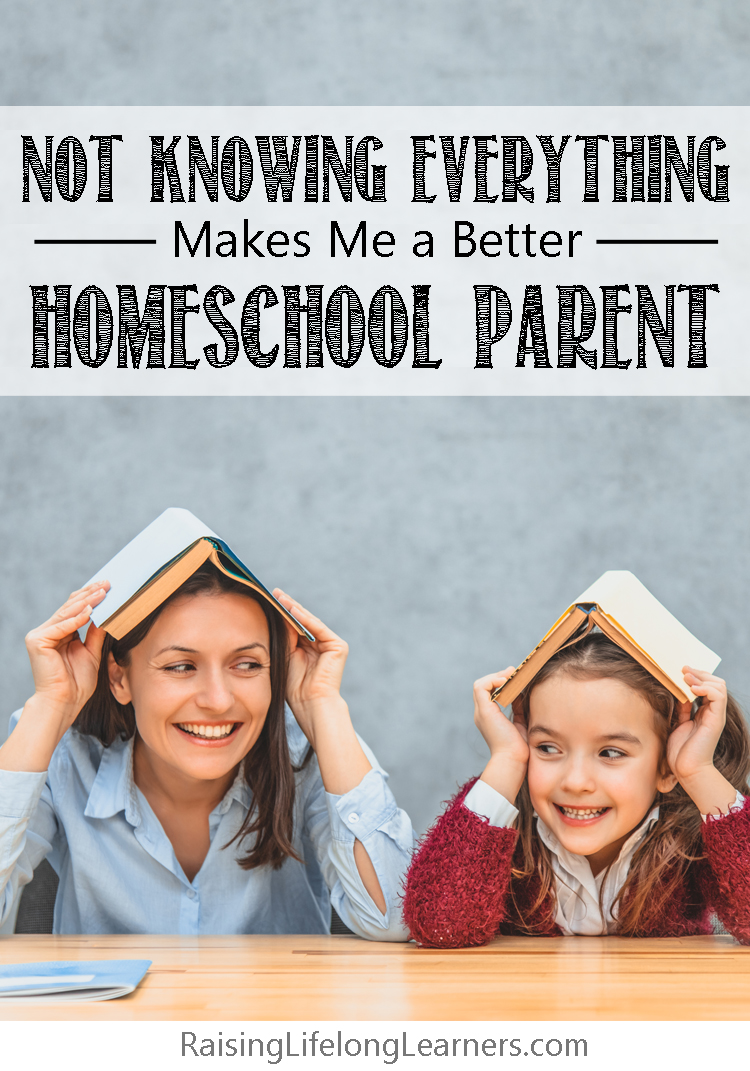Not Knowing All The Answers Makes Me A Better Homeschool Parent
You’ve heard of the 80/20 rule, I’m sure. Usually it means that 20% of the people in an organization do 80% of the work, but it means something different to a homeschool mom. To homeschool parents it may represent the 80% of people who declare they could never homeschool compared to the 20% of people they meet who are genuinely interested. In most homeschool circles, the 80/20 rule could stand for the amount of time the kids are socializing (80%) versus the amount of time spent in workbooks at home in solitude (way less than 20%).
In my house, the 80/20 rule works for the amount of questions I’m asked on any given day – I can easily answer about 20% of them, but in general I have no idea what to say to a solid 80% of them. I’m not ashamed to say this, I’m not embarrassed. My abilities as a homeschool parent aren’t lessened or called into question because I don’t happen to know how many different species of hummingbirds there are (five) or what the odds of having identical quadruplets are (roughly 1 in 11-15 million). I have Google, sure, and usually that’s enough to move on, but often we end up opening a whole can of worms that leads to a rabbit hole down a hyper-specific topic, and learning for the day takes a steep turn to the right. This is what excites me. This is why I love homeschooling. This is why not knowing the answer makes me a better homeschool parent.
As a homeschooler, I’m an educator as well as a parent (and chauffeur, and lunch lady, and custodian, and…). I have a lot of important roles to fill and a lot of important things to impart upon my children. Given all of the things they need to learn from me, though, I’m still aware of the fact that parroting back what I say to them isn’t really learning. Whatever facts or formulas I share, that’s not true education. Those are just blanks to fill in, boxes to check, sentences to memorize for future testing or possible Jeopardy! appearances.
True education doesn’t come from teachers, from educators – it comes from all around the child. The entire world is a classroom ready to teach a child anything. We, the homeschool parents, are only facilitators, creating lifelong learners.
True education comes from within the child, from the desire to learn and know, the natural curiosity they’re born with. Education comes from the love of learning and the knowledge and skills to pursue answers. Education isn’t something a child receives, it’s something they harness. It’s our job to show them the ropes and get out of the way.
Since education is a tool to be used, not an object to be possessed, I would be doing my child a disservice if I answered every one of his questions. By spouting off facts I would be depriving him of the chance to research, discover, and learn for himself. In order for him to be able to learn, he has to be shown how.
Related: Homeschooling a Kid Who is Smarter Than I Am , Falling Unexpectedly in Love With Homeschooling My Gifted Child
Children don’t learn from being given a clean answer and moving on. How many times have you answered an odd question about Santa Claus, only to be met by a torrent of 30 more? Children’s curiosity is sparked by answers, not quenched, and the more freedom we give them to find the answers themselves, the more they’ll naturally learn along the way.
Showing a child how to research, teaching them about finding multiple sources, even the long-lost art of thumbing through an encyclopedia empowers them. Teaching a child how to find answers, rather than tossing one at them, exposes them to all sorts of information along the way, giving them a better shot at a well-rounded answer, not just a fill-in-the-blank one. Then there’s that old saying, “If you feed a man a fish…” Well, the same holds true for children. If you feed them an answer, you’ve satisfied their curiosity for a moment. If you teach a child how to find an answer, you’ve opened their entire world up to learn for the rest of their lives.
Still, there will be some who question, “So what am I supposed to say to my child when they ask a tough question? Tell them that I don’t know?!” Yeah, exactly that.
Contrary to some beliefs, admitting that you don’t know an answer doesn’t make you look any less educated or intelligent, it shows an acceptance and awareness of your abilities and the willingness to correct the deficits. Admitting when you don’t know an answer models for your children that it is okay to not know everything and that, rather than being the end of your influence, it’s the beginning of a journey. This is when you open up the books, fire up the computer, and say, “I don’t know, but let’s find out.”
Related: Diving Down Rabbit Holes and Following Kids’ Interests, Why Should You Homeschool Your Gifted Children?
Teaching your children is a heck of a lot more important than impressing them, so model curiosity and learning for them by admitting that despite being able to see everything, wink wink, you don’t actually know everything.
Homeschool is as much about facilitating and getting out of the way as it is about instruction. As closely as our kids are watching and listening, they’re not picking up as much from what we say as they can from what they do. Giving them the tools to answer a question for themselves isn’t lazy, it’s not an escape, and it’s not a sign of my intelligence – it’s the best possible thing we can teach them.




